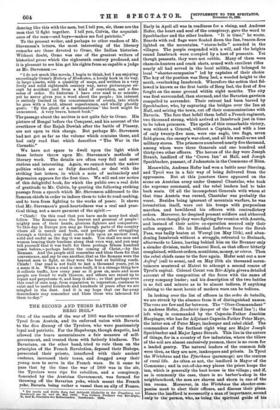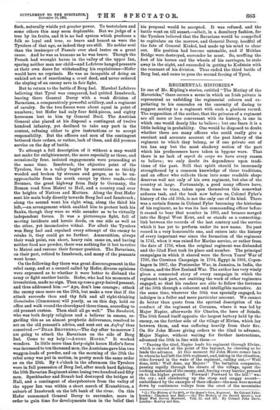THE SECOND AND THIRD BATTLES OF BERG ISEL.*
ONE of the results of the war of 1805 was the severance of Tyrol from Austria, and its enforced union with Bavaria to the dire dismay of the Tyrolers, who were passionately loyal and patriotic. For the Hapsburgs, though despotic, had allowed the brave mountaineers a fair measure of self- government, and treated them with fatherly kindness. The Bavarians, on the other hand, tried to rule them on the principles of the French Revolution, deposed their Bishops, persecuted their priests, interfered with their ancient customs, increased their taxes, and dragged away their young men to serve in the French wars. So it came to pass that by the time the war of 1809 was in the air, the Tyrolers were ripe for rebellion, and a conspiracy, fomented by the Austrian Government, was formed for throwing off the Bavarian yoke, which meant the French yoke, Bavaria being rather a vassal than an ally of France.
• Die zwrite und &tilts Berg Iset &bloat (Gefechte in der Umgebung von Innsbruck ant 25. and 99. Mai 1809). Von Gedeon Freiherr, on Riv•Alpin, K. and K. Oberston des Ituhestandes. Innsbruck. 1895. Early in April all was in readiness for a rising, and Andreas Hofer, the heart and soul of the conspiracy, gave the word to Spechbacher and the other leaders. "It is time," he wrote. Boards with red flags were floated down the Inn, beacon-fires lighted on the mountains, " storm-bells " sounded in the villages. The people responded with a will, and the heights round Innsbruck were oacupied by a host of peasants. Yet though peasants, they were not rabble. Many of them were chamois-hunters and crack shots, armed with excellent rifles nearly all had served in the local militia, and belonged to local " shooter-companies " led by captains of their choice The key of the position was Berg Isel, a wooded height to the south, overlooking Innsbruck. Wherefore the action that fol- lowed is known as the first battle of Berg Isel, the first of five fought on the same ground within eight months. The city was first surrounded, then stormed, and the Bavarian garrison compelled to surrender. Their retreat had been barred by Spechbacher, who, by capturing the bridges over the Inn at Hall, and seizing the town, cut off their communications with Bavaria. The fate that befell them befell a French regiment, two thousand strong, which arrived at Innsbruck just in time to be taken prisoners. The spoils of this remarkable victory, won without a General, without a Captain, and with a loss of only twenty-five men, were one eagle, two flags, seven field-pieces, the enemy's war-chest, and all his small-arms and military stores. The prisoners numbered nearly five thousand, among whom were three Generals and one hundred and thirty-two other officers. The heroes of the day were Joseph Straub, landlord of the 'Crown Inn' at Hall, and Joseph Spechbacher, peasant, of Judenstein in the Commune of Rinn.
Meanwhile, Andreas Hofer had won a battle near Sterzing, and Tyrol was in a fair way of being delivered from the oppressors. But at this juncture there appeared on the scene an Austrian army under General Chastelar, who took the supreme command, and the rebel leaders had to take back seats. Of all the incompetent Generals with whom at that time Austria was cursed, Chastelar was probably the worst. Besides being ignorant of mountain warfare, he was irresolution itself, wore out his troops with purposeless marches, and bewildered his officers with contradictory orders. Moreover, he despised peasant soldiers and abhorred rebels, even though they were fighting for reunion with Austria, and instead of their active co-operation secured only their sullen support. He let Marshal Lefebvre force the Strub Pass, was badly beaten at Woergl (on May 11th), and aban- doning Innsbruck without a struggle, retreated to Steiiaach, afterwards to Lienz, leaving behind him on the Brenner only a slender division, under General Buol, as that officer bitterly complained, without orders, munitions, money, or vivres. Then the rebel chiefs came to the fore again. Hofer sent out a new Aufruf (call to arms), and on May 25th six thousand moun- taineers mustered at Matrei to attempt a second rescue of Tyrol's capital. Colonel Count von Riv-Alpin gives a detailed account of the composition of the force with the name of every company leader ; and his description of the two battles is so full and minute as to be almost tedious, if anything relating to the most heroic of modern wars can be tedious.
In looking over the list of officers in the ordre de bataille, we are struck by the absence from it of distinguished names. The vons are few and far between. The " Ober-Commandant " is Andreas Hofer, Sandwirt (keeper of the Sand Inn '); the left wing is commanded by the Capucin-Father Joachim Haspinger, who has for Adjutant Capucin-Father Peter Mayr, the latter son of Peter Mayr, innkeeper and rebel chief. The commanders of the furthest right wing are Major Joseph Spechbacher and Major Ignaz Straub. This lies in the nature of things, for in a country of few industries, where the tillers of the soil are almost exclusively yeomen, there is no room for a landed gentry. The natural leaders of the common folk were then, as they are now, innkeepers and priests. In Tyrol the Wirtshaus and the Pfarrhaus (parsonage) are the centres of rural life. As often as not, the landlord is Mayor of the Commune ; and in out-of-the-way places the priest keeps the inn, which is generally the best house in the village ; and if, as is commonly the case, there is no barber's-shop in the neighbourhood, the men are shaven and shorn in one of the inn rooms. Moreover, in the Wirtshaus the shooter-com- panies meet to elect their officers, and discuss their plans. Hence the landlord is necessarily a man of importance, second only to the parson, who, as being the spiritual guide of his
flock, naturally wields yet greater power. To teetotalers and some others this may seem deplorable. But we judge of a tree by its fruits, and it is no bad system which produces a folk so loyal and true, so brave and honest as were the Tyrolers of that age, as indeed they are still. No nobler soul than the innkeeper of Passeir ever shed lustre on a great cause. And he was as humane as he was brave. Though the French had wrought havoc in the valley of the upper Inn, sparing neither man nor child—and Lefebvre hanged peasants at their own doors for withstanding his requisitions—Hofer would have no reprisals. He was as incapable of doing an unkind act as of sanctioning a cruel deed, and never ordered the slaying of an enemy save in fair fight.
But to return to the battle of Berg Isel. Marshal Lefebvre believing that Tyrol was conquered, had quitted Innsbruck, leaving there General Deroy with a weak division of Bavarians, a comparatively powerful artillery, and a regiment of cavalry. So the two forces were about equal in point of numbers ; but Hofer had only four field-pieces, and eighty horsemen lent to him by General Bnol. The Austrian General also placed at his disposal a contingent of twelve hundred infantry, yet declined to take any part in the contest, refusing either to give instructions or to accept responsibility. But the officers and men of the contingent bettered their orders, or rather, lack of them, and did yeoman service on the day of battle.
To attempt a full description of it without a map would not make for enlightenment, the more especially as three, and occasionally four, isolated engagements were proceeding at the same time. Innsbruck, the objective point of the Tyrolers, lies in a valley begirt by mountains so thickly wooded and broken by streams and gorges, as to be un- approachable from the south except by three roads,—the Brenner, the great highway from Italy to Germany, the Roman road from Matrei to Hall, and a country road over the heights of Natters and Mutters. Along the first Hofer sent his main body directly towards Berg Isel and Innsbruck ; along the second went his right wing, along the third his left,—an arrangement which enabled him to protect both his flanks, though they were so wide asunder as to be virtually independent forces. It was a picturesque fight, full of moving incidents and heroic deeds, on one side as well as the other, yet inconclusive withal. For albeit the Tyrolers won Berg Isel and repulsed every attempt of the enemy to retake it, they could go no further. Ammunition, always their weak point, ran short, heavy rain came on, and having neither food nor powder, there was nothing for it but to retire to Matrei and resume their former position. The Bavarians, on their part, retired to Innsbruck, and many of the peasants went home.
On the following day there was great discouragement in the rebel camp, and at a council called by Hofer, diverse opinions were expressed as to whether it were better to disband the army or fight another battle. Hofer, who had his moments of irresolution, made no sign. Then up rose a grey-haired peasant,
and thus addressed him Aye, don't lose courage ; attack the enemy once more on the 29th, but make a vow that if the attack succeeds thou and thy folk and all right-thinking Gemeinden (Communes) will yearly, as on this day, hold an office and walk round the churchyard three times, according to old peasant custom. Then shall all go well." The Sandwirt, who was both deeply religious and a believer in omens, re- garding this as an almost prophetic deliverance, resolved to act on the old peasant's advice, and sent out an Aufruf thus conceived :—" DEAR BROTHERS,—The day after to-morrow I am going to attack the Bavarians on the side of Berg
Isel. Come to my help !—ANDNE HOFER." It worked wonders. In little more than forty-eight hours Hofer's force was increased to ten thousand men, the Austrians gave him two waggon-loads of powder, and on the morning of the 29th the rebel army was put in motion, in pretty much the same order as on the 25th. By 4 o'clock in the afternoon the Tyrolers were in full possession of Berg Isel, after much hard fighting, the 10th Bavarian Regiment alone losing two hundred and fifty men. Spechbacher and Straub had destroyed the bridges at Hall, and a contingent of sharpshooters from the valley of the upper Inn was within a short march of Kranebitten, a suburb of Innsbruck on the left bank of the river. On this Hofer summoned General Deroy to surrender, more in order to gain time for developments than in the belief that his proposal would be accepted. It was refused, and the battle went on till sunset,—albeit, in a desultory fashion, for the Tyrolers believed that the Bavarians would be compelled to capitulate on the morrow, and General Deroy, heedful of the fate of General Kinkel, had made up his mind to clear out. His position had become untenable, and if Aliihlau Bridge were destroyed, surrender he must. So, muffling the feet of his horses and the wheels of his carriages, he stole away in the night, and succeeded in getting to Kufstein with the remnant of his division. Thus ended the third battle of Berg Isel, and came to pass the second freeing of Tyrol.



















































 Previous page
Previous page